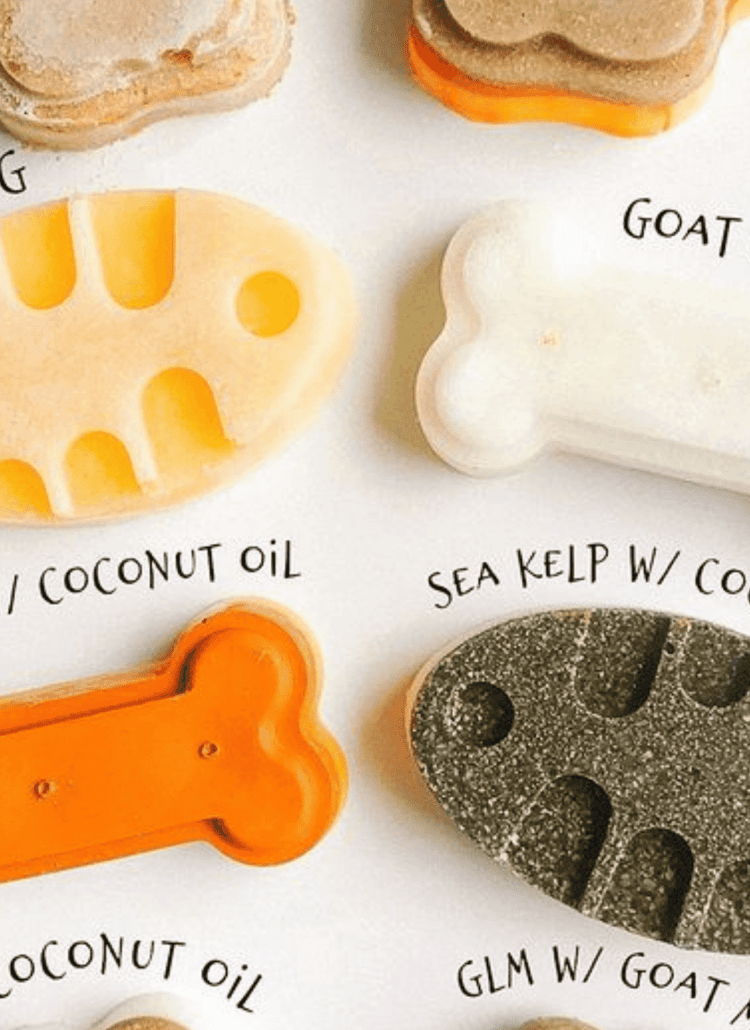As dog moms, we all strive to see our furry companions thriving with vitality and happiness. Yet, just like us, they may and often do encounter health challenges along the way. This is where the power of natural remedies comes into play, and one such remedy that has garnered attention in recent years is turmeric. Renowned for its potent anti-inflammatory and antioxidant properties, turmeric has been celebrated in human health circles for centuries. But what about our canine companions? Recent studies have shed light on the potential benefits of turmeric for dogs, offering hope for alleviating various health issues and enhancing their overall well-being.

Keeping up with the research and trying to find ways to improve the lives of my two Labradoodles, Levi and Luna, drives me. Yes, I’m one of those dog moms that questions everything! We have been using turmeric on and off ever since I came upon its health benefits years ago. Below I will share with you things I have learned about turmeric, what turmeric side effects you should be aware of, where to find more information about the use of turmeric on dogs, and the products we have used and love.
In this article:
What is turmeric?
What are the benefits of turmeric?
Is turmeric safe for dogs?
How much turmeric should you give your dog?
How we feed it to our dogs
What is Turmeric?
Turmeric (Curcuma Longa), a ginger relative, is a plant native to Southeast Asia, primarily India, containing numerous positive health benefits both to humans and dogs. A rhizome, turmeric has been used in Ayurveda and traditional Chinese medicine for 4,000 years.
Originating from the Indian subcontinent, turmeric holds a revered status in Ayurveda, the ancient Indian system of holistic healing, dating back over 5,000 years. Revered as “Indian saffron,” its vibrant golden hue not only brightens culinary dishes but also symbolizes vitality and prosperity. Ayurvedic texts sing praises to turmeric’s multifaceted medicinal properties, deeming it a potent “rasayana” or rejuvenating herb. Within Ayurveda, turmeric finds extensive use in formulations targeting inflammation, digestive disorders, respiratory ailments, and skin conditions.
Beyond India, turmeric’s therapeutic legacy extends into Traditional Chinese Medicine (TCM), where it’s regarded as a “warming” spice believed to invigorate circulation and alleviate stagnation. From ancient Persia to Southeast Asia, turmeric’s ubiquity in traditional pharmacopeias underscores its enduring significance as a revered botanical panacea for promoting health and longevity.
Aside from its medicinal uses, turmeric has also been used as a condiment, textile dye, and in perfumes.
Chemical Composition of Turmeric
Rich yellow in color, and with an earthy taste, turmeric is the common spice in curries. Curcumin, its active component (and what keeps scientists coming back), is what gives turmeric its antiviral, antifungal, antioxidant, antibacterial, and anti-inflammatory properties.
Curcumin is a polyphenolic compound responsible for its vibrant color and therapeutic properties. Constituting approximately 2-5% of turmeric by weight, curcumin serves as the primary active ingredient, heralded for its potent anti-inflammatory, antioxidant, and antimicrobial properties.
Alongside curcumin, turmeric contains essential oils, including turmerone, ar-turmerone, and zingiberene, which contribute to its distinct aroma and flavor profile.
Because turmeric is rapidly metabolized by the liver and intestinal wall researchers have found ways to increase the body’s absorption. Studies have shown that incorporating black pepper helps increase turmeric’s bioavailability. According to Planet Paws Media “a source of fresh ground black pepper and a healthy fat can turn this solo herb, turmeric, into a super powerful rock band!”
The best turmeric supplements contain either piperine, the alkaloid responsible for the pungency of black pepper, or bromelain, a proteolytic enzyme found in the pineapple.
What are the benefits of turmeric for dogs?
Ayurvedic medicine practitioners have used turmeric for a variety of health conditions including inflammation, chronic pain, skin diseases, digestive issues, and liver conditions.
Among its qualities, turmeric has the ability to improve liver function;
improve digestion by stimulating the gallbladder to produce bile;
and has shown some anti-cancer properties.
Mount Sinai reports:
There has been a great deal of research on turmeric’s anti-cancer properties, but results are still preliminary. Evidence from test tube and animal studies suggests that curcumin may help prevent or treat several types of cancers, including prostate, breast, skin, and colon cancer. Tumeric’s preventive effects may relate to its antioxidant properties, which protect cells from damage.
This is what Cancer Research UK had to say about turmeric:
Several studies have looked into whether curcumin could be a cancer treatment. These have had some promising results.
One of these in 2013 was an international laboratory study on bowel cancer cells. It looked at the effects of combined treatment with curcumin and chemotherapy. The researchers concluded that the combined treatment might be better than chemotherapy alone.
This hits home for us for many reasons, one of which is the passing of two of our dogs due to cancer. But this is not all:
Anti-Flammatory
Turmeric’s remarkable anti-inflammatory properties have garnered widespread attention, offering a natural alternative for alleviating various health ailments. In the realm of arthritis and joint pain, turmeric’s active compound, curcumin, exerts potent anti-inflammatory effects by inhibiting inflammatory enzymes and pathways. By modulating the activity of cytokines and enzymes involved in the inflammatory response, curcumin helps mitigate pain and swelling associated with arthritis, promoting improved joint mobility and function.
Turmeric’s anti-inflammatory properties extend to addressing allergies and skin conditions, where inflammatory responses play a pivotal role. By targeting inflammatory mediators and oxidative stress, curcumin aids in mitigating allergic reactions and soothing irritated skin, offering relief from symptoms such as itching, redness, and inflammation. Whether applied topically or consumed orally, turmeric’s anti-inflammatory prowess presents a promising avenue for managing a spectrum of inflammatory conditions, ranging from arthritis-induced joint pain to allergic skin reactions, ultimately enhancing overall well-being and quality of life.
Antioxidant Powerhouse
Turmeric’s antioxidant properties serve as a formidable shield against cellular damage, bolstering the body’s defenses and promoting overall health. Central to its antioxidant prowess is curcumin, the primary bioactive compound in turmeric, which scavenges harmful free radicals and neutralizes oxidative stress. By quenching reactive oxygen species (ROS) and inhibiting lipid peroxidation, curcumin safeguards cellular structures and DNA from oxidative damage, thus mitigating the risk of chronic diseases and premature aging.
Turmeric’s antioxidant activity extends to bolstering immune function, vital for maintaining a robust defense against pathogens and infections. Curcumin enhances immune response by modulating immune cell activity, stimulating antibody production, and reducing inflammation. By fortifying cellular resilience and supporting immune function, turmeric emerges as a potent ally in preserving overall health and vitality, offering protection against the ravages of oxidative stress and bolstering the body’s innate defenses.
Digestive Aid
Turmeric’s digestive aid powers stem from its multifaceted properties that support gastrointestinal health and promote a harmonious balance within the gut microbiome. As a natural anti-inflammatory agent, turmeric helps soothe irritated digestive tracts by reducing inflammation and alleviating symptoms such as bloating, gas, and discomfort. Curcumin, its active compound, plays a pivotal role in regulating digestive enzyme activity, thereby enhancing nutrient absorption and optimizing digestive function.
Turmeric has been found to exhibit antimicrobial properties that help combat harmful bacteria and pathogens in the gastrointestinal tract, promoting a healthy microbial balance. By fostering a favorable environment for beneficial gut bacteria, turmeric supports the proliferation of probiotics essential for maintaining optimal gut flora and digestive wellness.
And let’s not forget turmeric’s prebiotic properties that nourish beneficial gut bacteria and facilitate their growth and colonization. Through its combined actions as an anti-inflammatory, antimicrobial, and prebiotic agent, turmeric emerges as a potent digestive aid, promoting digestive tract health and fostering a thriving gut microbiome essential for overall well-being.
“Turmeric has been traditionally used as an antiseptic, antibacterial, anti-inflammatory, choleretic, and carminative agent in the treatment of wounds and burns, gastrointestinal and liver disorders, respiratory system diseases (e.g., asthma, cough, runny nose, sinusitis), anorexia, and rheumatism.” – National Library of Medicine
Is turmeric safe for dogs?: Precautions and Potential Side Effects
Turmeric is mostly considered safe, but as for any supplement, some dogs may experience some side effects, and these have been found to be mostly due to high dosage. Reported side effects include upset stomach, dizziness, and nausea.
Interactions with Medications
Recent studies have shed light on potential interactions between turmeric and medications in dogs, emphasizing the importance of caution and veterinary oversight. Turmeric, particularly its active compound curcumin, can affect the activity of certain enzymes in the liver responsible for metabolizing medications. This may lead to altered drug metabolism and potential changes in medication efficacy or toxicity levels. For example, turmeric may interact with drugs that are metabolized by the cytochrome P450 enzyme system, such as certain antibiotics, anti-inflammatory drugs, or chemotherapy medications.
Additionally, turmeric’s anticoagulant properties may interact with blood-thinning medications, posing a risk of increased bleeding. Therefore, it’s crucial to inform your veterinarian about any medications your dog is taking before introducing turmeric into their diet.
A veterinarian can provide personalized guidance on dosage adjustments or alternative treatment options to minimize the risk of adverse interactions and ensure the safety and efficacy of your dog’s medication regimen.
Possible Allergic Reactions
While turmeric is generally well-tolerated by most dogs, some individuals may exhibit hypersensitivity reactions, ranging from mild itching and skin irritation to more severe symptoms such as hives, swelling, or gastrointestinal upset. These allergic reactions can occur due to sensitivity to certain compounds present in turmeric, such as curcumin or other constituents. Furthermore, cross-reactivity with other allergens or sensitivities to plants within the same botanical family (Zingiberaceae) may contribute to allergic responses in susceptible dogs. Therefore, you should monitor your dog closely when introducing turmeric into their diet and be alert to any signs of adverse reactions.
Other side affects
According to Future You Cambridge “If your dog is prone to kidney stones, turmeric tablets may make this problem worse as it can increase urinary oxalate levels. This makes the formation of kidney stones more likely.”
Other side effects reported have been worsening gallbladder problems, decreased blood sugar, and iron deficiency. Turmeric is a blood thinner after all, and therefore clotting issues may occur.
Monitoring for Stomach Upset
While turmeric is generally considered safe for dogs in moderate amounts, excessive consumption or abrupt introduction may lead to digestive disturbances such as diarrhea, vomiting, or abdominal discomfort. This can be attributed to turmeric’s inherent properties as a spice, which, when consumed in large quantities, may irritate the stomach lining and disrupt digestive function. Additionally, individual variations in gastric sensitivity and underlying gastrointestinal conditions may predispose certain dogs to a higher risk of stomach upset. Monitoring for signs of stomach upset and adjusting dosage accordingly can help minimize the risk of gastrointestinal discomfort and ensure a positive experience with turmeric supplementation for dogs.
Another thing to be aware of is contamination. Stanford researchers have found an industrial lead chromate pigment in turmeric used by some processors in Bangladesh to give the spice its bright yellow color. As we know, lead is a potent neurotoxin. Please keep this in mind when sourcing turmeric for you and your dog. If you can’t decide, grow your own!
As always, speak with your veterinarian before introducing turmeric to your dog’s diet. Here are some questions you should consider asking your vet:
- Is turmeric safe for my dog’s specific health condition?
- Are there any potential interactions between turmeric and medications my dog is currently taking?
- What is the appropriate dosage of turmeric for my dog’s size, age, and health status?
- How should I introduce turmeric into my dog’s diet to minimize the risk of digestive upset or allergic reactions?
- What signs should I watch for that may indicate my dog is experiencing adverse reactions to turmeric?
- Is it safe to combine turmeric with other dietary supplements or natural remedies my dog may be receiving?
How much turmeric should you give your dog?
Dogs Naturally Magazine recommends the dose of turmeric for dogs to be 15mg-20mg per pound of body weight.
How we feed it to our dogs
We either add it to frozen treats we make ourselves from raw goat milk or buy it in food toppers already made. We have tried and loved Primal Pet Foods Awesome Squash Topper. Awesome Squash Fresh Topper is formulated with butternut squash, apple cider vinegar, and organic cinnamon, turmeric, and ginger.
Another of our favorites is Kin and Kind Healthy Hip + Joint Supplement for Dogs:

Check out our post on 7 Surprising Dog Supplements for Healthier Pups for other treat ideas using turmeric.
We have also tried making these Turmeric Latte Golden Milk Gummy Dog Treats by Dalmatian DIY and love them!
The last recipe I want to share is how to make Turmeric Paste by Planet Paws:

Want to know more about all the health benefits of turmeric? Take a quick look at this four-minute video by Dr. Karen Becker at Mercola Healthy Pets.
As with everything we share here, please, please do your own research and speak with your vet before adding to or changing your dogs diet.




